DWT跟蹤組件
跟蹤組件:數(shù)據(jù)觀察點與跟蹤(DWT)

DWT 中有剩余的計數(shù)器,它們典型地用于程序代碼的“性能速寫”(profiling)。通過編程它們,就可以讓它們在計數(shù)器溢出時發(fā)出事件(以跟蹤數(shù)據(jù)包的形式)。
最典型地,就是使用 CYCCNT寄存器來測量執(zhí)行某個 任務(wù)所花的周期數(shù) ,這也可以用作時間基準(zhǔn)相關(guān)的目的(操作系統(tǒng)中統(tǒng)計 CPU使用率可以用到它)。
Cortex-M中的DWT
在 Cortex-M 里面有一個外設(shè)叫 DWT(Data Watchpoint and Trace),是用于系統(tǒng)調(diào)試及跟蹤。

它有一個32位的寄存器叫CYCCNT,它是一個向上的計數(shù)器,記錄的是內(nèi)核時鐘運行的個數(shù),內(nèi)核時鐘跳動一次,該計數(shù)器就加1,精度非常高,如果內(nèi)核時鐘是72M,那精度就是1/72M = 14ns,而程序的運行時間都是微秒級別的,所以14ns的精度是遠(yuǎn)遠(yuǎn)夠的。
最長能記錄的時間為:59.65s。計算方法為2的32次方/72000000。
當(dāng)CYCCNT溢出之后,會清0重新開始向上計數(shù)。
使用方法
要實現(xiàn)延時的功能,總共涉及到三個寄存器:DEMCR 、DWT_CTRL、DWT_CYCCNT,分別用于開啟DWT功能、開啟CYCCNT及獲得系統(tǒng)時鐘計數(shù)值。
DEMCR
想要使能DWT外設(shè),需要由另外的內(nèi)核調(diào)試寄存器DEMCR的位24控制,寫1使能(劃重點啦,要考試!!)。DEMCR的地址是0xE000 EDFC
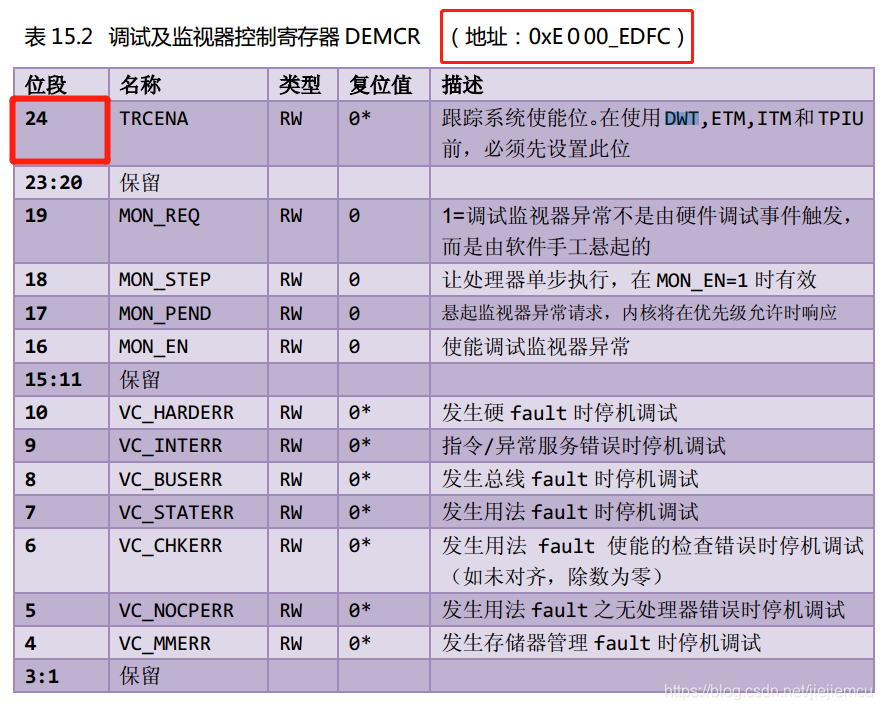
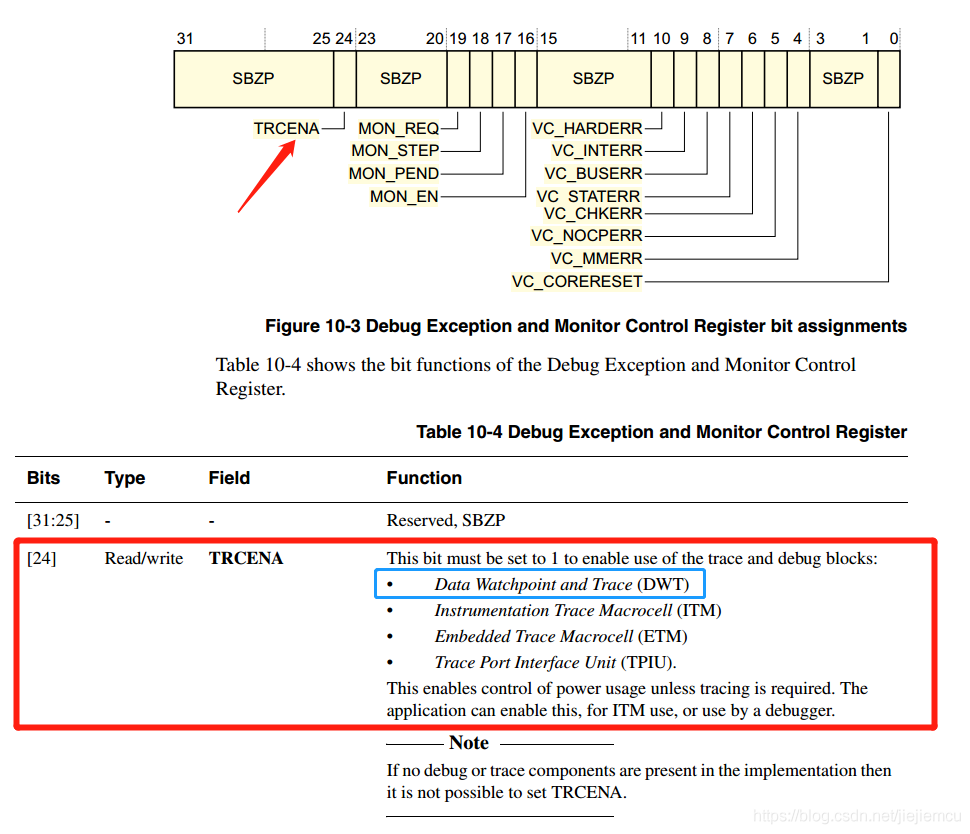
關(guān)于DWT_CYCCNT
使能DWT_CYCCNT寄存器之前,先清0。讓我們看看DWT_CYCCNT的基地址,從ARM-Cortex-M手冊中可以看到其基地址是0xE000 1004,復(fù)位默認(rèn)值是0,而且它的類型是可讀可寫的,我們往0xE000 1004這個地址寫0就將DWT_CYCCNT清0了。
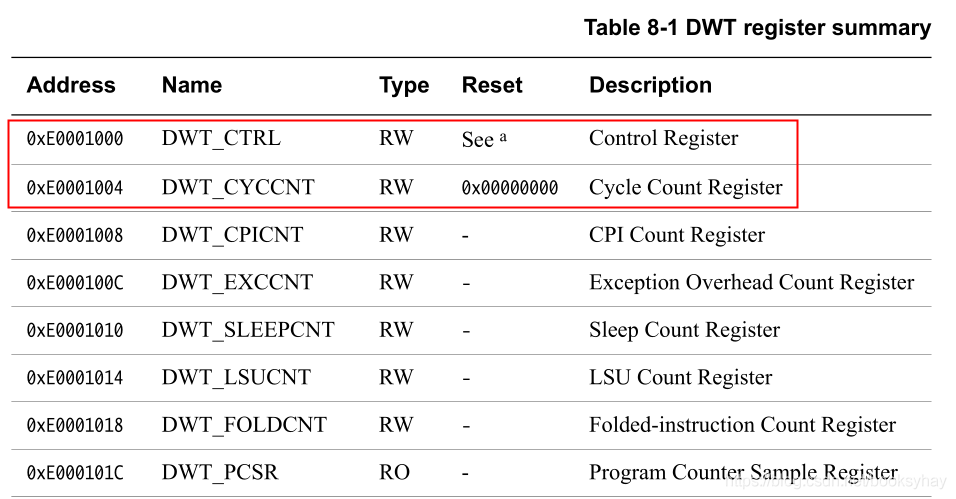
關(guān)于CYCCNTENA
CYCCNTENA Enable the CYCCNT counter. If not enabled, the counter does not count and no event is generated for PS sampling or CYCCNTENA. In normal use, the debugger must initialize the CYCCNT counter to 0.
它是DWT控制寄存器的第一位,寫1使能,則啟用CYCCNT計數(shù)器,否則CYCCNT計數(shù)器將不會工作。
【 https://developer.arm.com/documentation/ddi0337/e/system-debug/dwt/summary-and-description-of-the-dwt-registers?lang=en 】
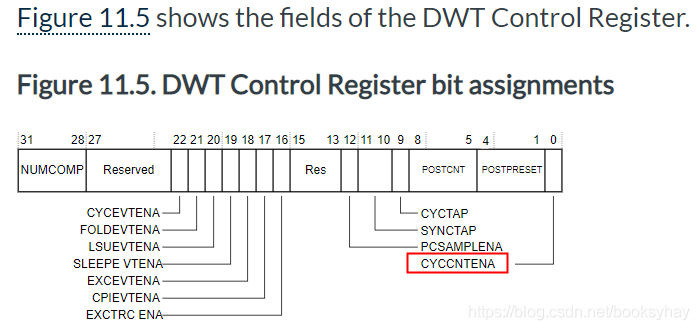
綜上所述
想要使用DWT的CYCCNT步驟:
- 先使能DWT外設(shè),這個由另外內(nèi)核調(diào)試寄存器 DEMCR 的位24控制,寫1使能
- 使能CYCCNT寄存器之前,先清 0。
- 使能CYCCNT寄存器,這個由DWT的CYCCNTENA 控制,也就是DWT控制寄存器的位0控制,寫1使能
寄存器定義:
//0xE000EDFC DEMCR RW Debug Exception and Monitor Control Register.
//使能DWT模塊的功能位
#define DEMCR ( *(unsigned int *)0xE000EDFC )
#define TRCENA ( 0x01 < < 24) // DEMCR的DWT使能位
//0xE0001000 DWT_CTRL RW The Debug Watchpoint and Trace (DWT) unit
//使能CYCCNT計數(shù)器開始計數(shù)
#define DWT_CTRL ( *(unsigned int *)0xE0001000 )
#define CYCCNTENA ( 0x01 < < 0 ) // DWT的SYCCNT使能位
//0xE0001004 DWT_CYCCNT RW Cycle Count register,
//CYCCNT計數(shù)器的內(nèi)部值(32位無符號)
#define DWT_CYCCNT ( *(unsigned int *)0xE0001004) //顯示或設(shè)置處理器的周期計數(shù)值
用法示例:
vvolatile unsigned int *DWT_CYCCNT ;
volatile unsigned int *DWT_CONTROL ;
volatile unsigned int *SCB_DEMCR ;
void reset_timer(){
DWT_CYCCNT = (int *)0xE0001004; //address of the register
DWT_CONTROL = (int *)0xE0001000; //address of the register
SCB_DEMCR = (int *)0xE000EDFC; //address of the register
*SCB_DEMCR = *SCB_DEMCR | 0x01000000;
*DWT_CYCCNT = 0; // reset the counter
*DWT_CONTROL = 0;
}
void start_timer(){
*DWT_CONTROL = *DWT_CONTROL | 1 ; // enable the counter
}
void stop_timer(){
*DWT_CONTROL = *DWT_CONTROL | 0 ; // disable the counter
}
unsigned int getCycles(){
return *DWT_CYCCNT;
}
main(){
....
reset_timer(); //reset timer
start_timer(); //start timer
//Code to profile
...
myFunction();
...
stop_timer(); //stop timer
numCycles = getCycles(); //read number of cycles
...
}
示例2:
#define start_timer() *((volatile uint32_t*)0xE0001000) = 0x40000001 // Enable CYCCNT register
#define stop_timer() *((volatile uint32_t*)0xE0001000) = 0x40000000 // Disable CYCCNT register
#define get_timer() *((volatile uint32_t*)0xE0001004) // Get value from CYCCNT register
/***********
* How to use:
* uint32_t it1, it2; // start and stop flag
start_timer(); // start the timer.
it1 = get_timer(); // store current cycle-count in a local
// do something
it2 = get_timer() - it1; // Derive the cycle-count difference
stop_timer(); // If timer is not needed any more, stop
print_int(it2); // Display the difference
****/
示例3:
#define DWT_CR *(uint32_t *)0xE0001000
#define DWT_CYCCNT *(uint32_t *)0xE0001004
#define DEM_CR *(uint32_t *)0xE000EDFC
#define DEM_CR_TRCENA (1 < < 24)
#define DWT_CR_CYCCNTENA (1 < < 0)
/* 初始化時間戳 */
void CPU_TS_TmrInit(void)
{
/* 使能DWT外設(shè) */
DEM_CR |= (uint32_t)DEM_CR_TRCENA;
/* DWT CYCCNT寄存器計數(shù)清0 */
DWT_CYCCNT = (uint32_t)0u;
/* 使能Cortex-M3 DWT CYCCNT寄存器 */
DWT_CR |= (uint32_t)DWT_CR_CYCCNTENA;
}
uint32_t OS_TS_GET(void)
{
return ((uint32_t)DWT_CYCCNT);
}
-
寄存器
+關(guān)注
關(guān)注
31文章
5336瀏覽量
120230 -
cpu
+關(guān)注
關(guān)注
68文章
10854瀏覽量
211583 -
DWT
+關(guān)注
關(guān)注
0文章
20瀏覽量
11136
發(fā)布評論請先 登錄
相關(guān)推薦
詳解DWT跟蹤組件的單片機調(diào)試技巧
DWT跟蹤組件使用方法
一個超級實用的單片機調(diào)試組件
DWT的相關(guān)資料下載
在STM32F10x中支持哪幾種調(diào)試接口呢
AT32使用內(nèi)核DWT寄存器設(shè)定延時時間
如何使用或啟用STM32CubeIDE DWT?
如何使用高級配置和電源接口(ACPI)支持CoreSight跟蹤組件
使用RealView MDK進行SW調(diào)試和實時跟蹤
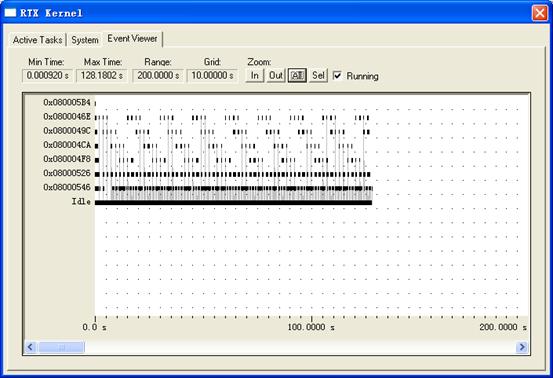
關(guān)于CoreSight中調(diào)試和跟蹤的相關(guān)內(nèi)容
STM32“隱藏的定時器”-DWT

詳解CoreSight技術(shù)中的調(diào)試和跟蹤功能
一個超級實用的單片機調(diào)試組件!

揭秘單片機調(diào)試利器值之DWT跟蹤組件





 DWT跟蹤組件調(diào)試
DWT跟蹤組件調(diào)試










評論